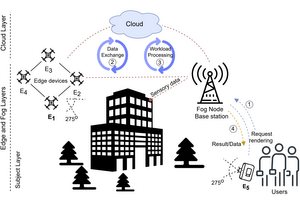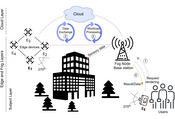Information
- Publication Type: Conference Paper
- Workgroup(s)/Project(s):
- Date: October 2021
- ISBN: 978-989-758-536-4
- Publisher: SciTePress
- Organization: INSTICC
- Lecturer: Ilir Murturi
- Event: 17th International Conference on Web Information Systems and Technologies - WEBIST
- Editor: Francisco Domínguez Mayo, Massimo Marchiori and Joaquim Filipe
- DOI: 10.5220/0010687800003058
- Call for Papers: Call for Paper
- Booktitle: Proceedings of the 17th International Conference on Web Information Systems and Technologies - WEBIST
- Pages: 6
- Conference date: 26. October 2021
– 28. October 2021
- Pages: 354 – 359
- Keywords: distributed systems, procedural geometry, rendering
Abstract
Contemporary applications such as those within Augmented or Virtual Reality (AR/VR) pose challenges for software architectures supporting them, which have to adhere to stringent latency, data transmission, and performance requirements. This manifests in processing 3D models, whose 3D contents are increasingly generated procedurally rather than explicitly, resulting in computational workloads (i.e., perceived as Procedural Geometry Workloads) with particular characteristics and resource requirements. Traditionally, executing such workloads takes place in resource-rich environments such as the cloud. However, the massive amount of data transfer, heterogeneous devices, and networks involved affect latency, which in turn causes low-quality visualization in user-facing applications (e.g., AR/VR). To overcome such challenges, processing elements available close to end users can be leveraged to generate 3D models instead, and as such the edge emerges as a central architectural entity. This paper describes such procedural geometry workloads, their particular characteristics, and challenges to execute them on heterogeneous devices. Furthermore, we propose an architecture capable of provisioning procedural geometry workloads in edge scenarios.
Additional Files and Images
Additional images and videos
Additional files
Weblinks
BibTeX
@inproceedings{murturi_PGG,
title = "On Provisioning Procedural Geometry Workloads on Edge
Architectures",
author = "Ilir Murturi and Chao Jia and Bernhard Kerbl and Michael
Wimmer and Schahram Dustdar and Christos Tsigkanos",
year = "2021",
abstract = "Contemporary applications such as those within Augmented or
Virtual Reality (AR/VR) pose challenges for software
architectures supporting them, which have to adhere to
stringent latency, data transmission, and performance
requirements. This manifests in processing 3D models, whose
3D contents are increasingly generated procedurally rather
than explicitly, resulting in computational workloads (i.e.,
perceived as Procedural Geometry Workloads) with particular
characteristics and resource requirements. Traditionally,
executing such workloads takes place in resource-rich
environments such as the cloud. However, the massive amount
of data transfer, heterogeneous devices, and networks
involved affect latency, which in turn causes low-quality
visualization in user-facing applications (e.g., AR/VR). To
overcome such challenges, processing elements available
close to end users can be leveraged to generate 3D models
instead, and as such the edge emerges as a central
architectural entity. This paper describes such procedural
geometry workloads, their particular characteristics, and
challenges to execute them on heterogeneous devices.
Furthermore, we propose an architecture capable of
provisioning procedural geometry workloads in edge
scenarios.",
month = oct,
isbn = "978-989-758-536-4",
publisher = "SciTePress",
organization = "INSTICC",
event = "17th International Conference on Web Information Systems and
Technologies - WEBIST",
editor = " Francisco Dom\'{i}nguez Mayo, Massimo Marchiori and Joaquim
Filipe",
doi = "10.5220/0010687800003058",
booktitle = "Proceedings of the 17th International Conference on Web
Information Systems and Technologies - WEBIST",
pages = "6",
pages = "354--359",
keywords = "distributed systems, procedural geometry, rendering",
URL = "https://www.cg.tuwien.ac.at/research/publications/2021/murturi_PGG/",
}


 paper
paper
